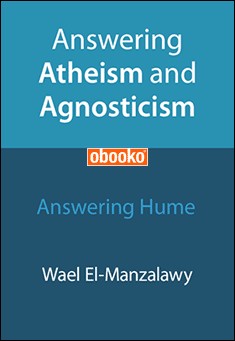This book is an attempt to criticize Hume's opinions about religion. You can read the following topics: Monotheism And Polytheism, The Necessity Of The Creator, Corruption Of Christianity And Judaism, Man Between Misery And Happiness, Good And Evil .........and others.
This is the first book in the "Answering Atheism And Agnosticism" Series. The second book of the series: "Answering Bertrand Russell" attempts to answer Bertrand Russell's article: "Why I Am Not A Christian"
Excerpt:
Monotheism And Polytheism I
Hume says:
“It appears to me, that, if we consider the improvement of human society, from rude beginnings to a state of greater perfection, polytheism or idolatry was, and necessarily must have been, the first and most ancient religion of mankind.”
Hume says:
“As far as writing or history reaches, mankind, in ancient times, appear universally to have been polytheists. Shall we assert, that, in more ancient times, before the knowledge of letters, or the discovery of any art or science, men entertained the principles of pure theism? That is, while they were ignorant and barbarous, they discovered truth: But fell into error, as soon as they acquired learning and politeness.”
Hume says:
“It seems certain, that, according to the natural progress of human thought, the ignorant multitude must first entertain some groveling and familiar notion of superior powers, before they stretch their conception to that perfect Being, who bestowed order on the whole frame of nature. We may as reasonably imagine, that men inhabited palaces before huts and cottages, or studied geometry before agriculture; as assert that the Deity appeared to them a pure spirit, omniscient, omnipotent, and omnipresent, before he was apprehended to be a powerful, though limited being, with human passions and appetites, limbs and organs. The mind rises gradually, from inferior to superior: By abstracting from what is imperfect, it forms an idea of perfection: And slowly distinguishing the nobler parts of its own frame from the grosser, it learns to transfer only the former, much elevated and refined, to its divinity. Nothing could disturb this natural progress of thought, but some obvious and invincible argument, which might immediately lead the mind into the pure principles of theism, and make it overleap, at one bound, the vast interval which is interposed between the human and the divine nature. But though I allow, that the order and frame of the universe, when accurately examined, affords such an argument; yet I can never think, that this consideration could have an influence on mankind, when they formed their first rude notions of religion.
The causes of such objects, as are quite familiar to us, never strike our attention or curiosity; and however extraordinary or surprising these objects in themselves, they are passed over, by the raw and ignorant multitude, without much examination or enquiry. ADAM, rising at once, in paradise, and in the full perfection of his faculties, would naturally, as represented by MILTON, be astonished at the glorious appearances of nature, the heavens, the air, the earth, his own organs and members; and would be led to ask, whence this wonderful scene arose. But a barbarous, necessitous animal (such as a man is on the first origin of society), pressed by such numerous wants and passions, has no leisure to admire the regular face of nature, or make enquiries concerning the cause of those objects, to which from his infancy he has been gradually accustomed. On the contrary, the more regular and uniform, that is, the more perfect nature appears, the more is he familiarized to it, and the less inclined to scrutinize and examine it. A monstrous birth excites his curiosity, and is deemed a prodigy. It alarms him from its novelty; and immediately sets him a trembling, and sacrificing, and praying. But an animal, complete in all its limbs and organs, is to him an ordinary spectacle, and produces no religious opinion or affection. Ask him, whence that animal arose; he will tell you, from the copulation of its parents. And these, whence? From the copulation of theirs. A few removes satisfy his curiosity, and set the objects at such a distance, that he entirely loses sight of them. Imagine not, that he will so much as start the question, whence the first animal; much less, whence the whole system or united fabric of the universe arose. Or, if you start such a question to him, expect not, that he will employ his mind with any anxiety about a subject, so remote, so uninteresting, and which so much exceeds the bounds of his capacity.









